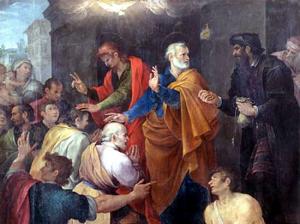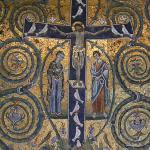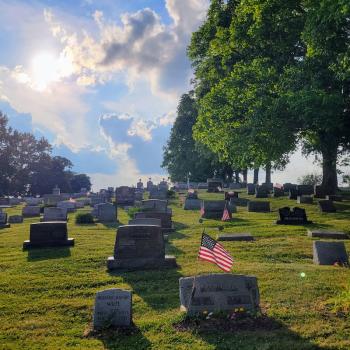
Now when the apostles in Jerusalem heard that Samaria had accepted the word of God, they sent them Peter and John, who went down and prayed for them, that they might receive the Holy Spirit, for it had not yet fallen upon any of them; they had only been baptized in the name of the Lord Jesus. Then they laid hands on them and they received the Holy Spirit.
Acts 8:14-17
This unique incident in Acts is well worth contemplating during this curious time between the Ascension and Pentecost. In both these nine days and among the baptized in Samaria before the arrival of Peter and John, we see the existence of the Body of Christ in the communion of believers, but suspended in an incomplete state without the indwelling of the Holy Spirit. It is worth taking a close look at this “provisional church” as I call it.
The provisional church is indeed the Body of Christ. It has experienced the saving power of the crucifixion and resurrection. It has received the Great Commission, the injunction to evangelize the whole world (Mat 28:19-20). It has received the authority to administer the sacraments: for example, Baptism (Mat 28:19) and Reconciliation (John 20:23) have already been clearly delineated. It is a communion of believers devoted to common prayer (Acts 1:14). It is even capable of receiving divine revelation through that prayer (Cf. Acts 1:15-26, where Peter determines a replacement for Judas is required and one is selected by casting lots after they are prayed over), even though we typically think of such revelation being “inspiration”—that is, coming from the indwelling of the Holy Spirit.
But the Body of Christ without the Holy Spirit is not ready to set forth on its mission of evangelization. It is gathered in private, praying and contemplating what it has received thus far. It is not ready to expand beyond the upper room. The preaching of the Gospel and conversion of thousands will begin at Pentecost.
The Body of Christ without the Holy Spirit attracts curious followers with its signs and wonders, but their wonder is not yet a spirit-given faith that can hold them through “hard sayings” (Cf.John 6:60-69) and persecutions. Indeed, in the immediately preceding verses in Acts 8, we learn that Philip’s preaching and miracles in Samaria attracted the interest of a magician, who was baptized sans Holy Spirit with the others, and when he saw Peter and John later conferring the Holy Spirit, offered them money to have the same power. Peter rebukes the magician and makes it clear that the Holy Spirit is connected to an upright heart, not signs and wonders. The magician repents of his error and then Peter and John continue with evangelizing many additional Samaritan villages.
Peter tells us in one of his own Epistles how the Church with the Holy Spirit is called to evangelize: “Always be ready to give an explanation to anyone who asks you for a reason for your hope, but do it with gentleness and reverence, keeping your conscience clear, so that, when you are maligned, those who defame your good conduct in Christ may themselves be put to shame. For it is better to suffer for doing good, if that be the will of God, than for doing evil.” (I Pet 3:15-17) The Church with the Holy Spirit does not necessarily require miracles of healing to evangelize; rather, it is the miracle of speaking the Gospel “to each of us in our own native language” (Acts 2:8). It is a Church that promises spiritual bread of life (not bread that fills the stomach), and with persecutions.
As I consider the distinctions between the Body of Christ with and without the Holy Spirit, I am distressed to realize that most of the parishes and religious communities I’ve experienced look a lot more like the provisional church without, instead of the full Church born of, the Holy Spirit.
The Holy Spirit is rarely mentioned in homilies or study groups, in my experience. My pastor glosses over the mentions of the Holy Spirit and radical Christian love in the rich Farewell Discourse that is featured in the Gospel readings this time of year, instead seizing on “you will keep my commandments” to give a pedantic homily on the Ten Commandments each year. No recognition of Jesus clarifying “this is my commandment: love one another as I love you”; no delving into these rich verses describing the loving relationship between us and the Persons of the Trinity. His homilies look backward to the Old Testament from the very climax of the Gospel and in the midst of the institution of the Eucharist, without a spirit of love to animate it forward to the acts of the apostles.
We gather together to pray and worship and learn, but almost never go out to evangelize. I see a church rehearsing its rules internally, but rarely speaking the Gospel outside its walls, certainly not “to each in their native language,” or “with gentleness and reverence” toward the imago Dei in every listener. I see a church making the vulgar mistake of imagining it is persecuted whenever it is contradicted, not a church that is ready and willing to withstand real suffering for the sake of saving souls.
We may be able to get by without the indwelling of the Holy Spirit for personal salvation in a comfortable environment. But this is a stunted, provisional kind of faith that will render us the first in the door of the church and the last in the kingdom of heaven. We desperately need to know and embrace the Holy Spirit in order to go out into the world to tell the Good News.
For the Body of Christ to also be fully the Church, it must be “brought to life in the Spirit” (I Pet 3:18). We need our priests who stand in persona Christi to be open to and preach about the Holy Spirit. Thankfully, the effervescent loving, joyful, gentle evangelization of Pope Francis manifests the Holy Spirit enlivening his service to the Church, as was the case with his ultimate predecessor Peter, and many in between. Those of us who are laity need to embrace the Holy Spirit ourselves, guided by our Holy Father, and pray for all our priests to become faithful shepherds of a Spirit-filled Church devoted to making disciples of all nations.
Note: this article was originally published last year in modified form on our original Beyond All Telling blog.












